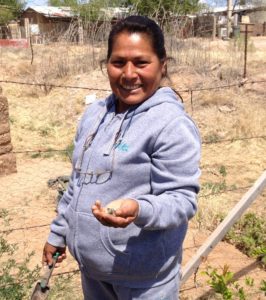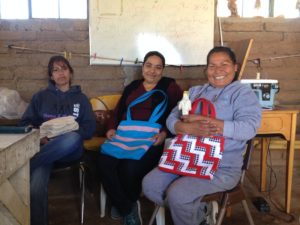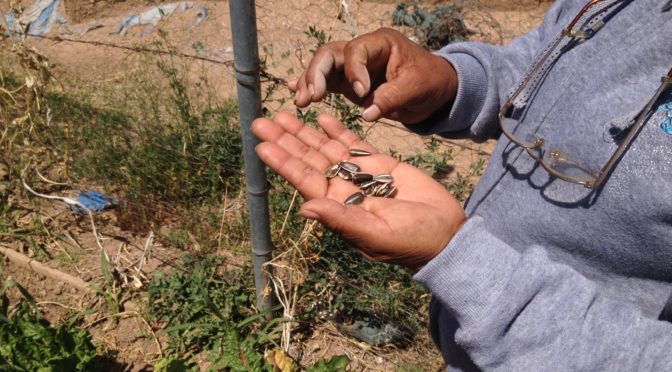The women’s sewing cooperative of DouglaPrieta Works (DPW) is the longest running and closest fair-trade sewing project in our region. The women of DPW make quality hand-sewn products and support a community center that teaches self-sufficiency and promotes food security in the community of Agua Prieta, Sonora. The women are agents for change in this post-colonized town, and the project demonstrates how our consumer choices can make radical differences in people’s lives, while countering the global capitalist paradigm that takes the means of production away from individuals—for everything from the clothes we wear to the food we eat.
DPW is a resistance group that fills in the barren holes left in communities by worker exploitation.
The name DouglaPrieta describes the group’s mission to dissolve the border between Agua Prieta and contiguous Douglas, Arizona, where an artificial wall creates real divides between those who have material prosperity and those who don’t. Thus, DPW is a resistance group that fills in the barren holes left in communities by worker exploitation. Many people from Agua Prieta worked in NAFTA factories, where they made products (including sewn goods) for export.
Since 2000, over two-thirds of the factories have moved to lower-wage zones in Asia. This has left more and more people un- or underemployed. Since 1990, the population of  Agua Prieta has risen from 37 thousand to two hundred thousand, including dozens of migrants deported daily from the United States.
Agua Prieta has risen from 37 thousand to two hundred thousand, including dozens of migrants deported daily from the United States.
DPW embraces a system where people can apply their skills to receive fair wages to support their families, and can pass their skills on to others, thus securing a livelihood for future generations. DPW has been collectively raising capital for infrastructure, equipment, and training to expand their program. Members make decisions together with the progress of all in mind.
The cooperative trains members in growing healthy food, building trades, and computer skills. Through perseverance, they have developed a community center with productive gardens and hand-made adobe structures. All members work in the garden, which contains food crops, fruit trees, herbs, and medicinal plants, and raise chickens for eggs and rabbits for meat. The gardening improves nutrition and self-esteem and teaches water harvesting, desert irrigation, erosion control, and use of beneficial bugs for control of other pests. The resources generated from sewing and food production benefit the members and support the center. Committed to a self-sufficiency that lives through future generations, DPW also teaches classes.
The cooperative trains members in growing healthy food, building trades, and computer skills. Through perseverance, they have developed a community center with productive gardens and hand-made adobe structures.
Cooperative member Trini Anguamea says, “We’ve had about 26 children come for sewing classes. They also come see the vegetables we grow. I know they’re going to learn something good.”
Churches, service clubs, and border aid groups order DPW bags, aprons, hot pads, and bandanas to sell at fundraisers. DPW provides “dignity bags” to No More Deaths for migrant deportees who have had their possessions taken during deportation. In Tucson, Tap & Bottle, Make Way For Books and Food Conspiracy Co-op order custom-printed tote bags and other items.
As sewing orders increase, the cooperative trains new women. “Each member also becomes an active gardener and participates in the group’s governance,” says Rosalinda Chavez. The collective meets with buyers to negotiate a wage that is fair and agreeable to the cooperative. This process elevates the concept of fair trade as it gives more power to the workers. Volunteers in Douglas transfer materials and help with orders and delivery, and courier the products over the border to Tucson and elsewhere.

The purchase of fair-trade DPW-sewn products benefits the women who make them and also supports a true local alternative to a global problem. DPW’s well-made products are produced in a manner increasingly hard to find in an industry that has raced to the bottom to get the cheapest labor. This same industry maximizes profits from American consumers, who are often thoughtless about the source and subsequent impacts of the products they buy.
Through 13 years of sewing, growing, and building economic self-reliance, DPW has taught and inspired many. Despite living in a town with a rapidly increasing population of deportees, unemployment, and health problems, the women of DPW demonstrate how to rebuild solid community and self-sufficiency in a climate of challenge. Through the struggle, Trini says, “One of the things we have learned is we don’t give up easy.”
Text and photos: Ray Younghans.

